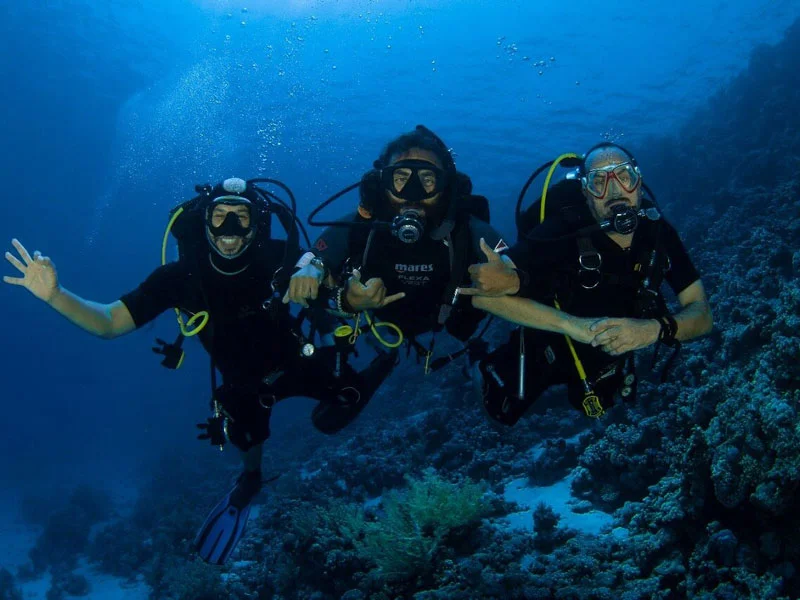Investigating decompression sickness in diving
- No Comment
“I have Bandez’s disease” is a very heavy and distressing statement that a diver might say. But denying the symptoms of DCS may lead you to the end of the line and face the harshest and saddest sentence possible: “You will never be able to dive again.” In this article from the Kish Diving and Marine Recreation Center, we are going to investigate the issue of decompression sickness in diving. So, dear friends, we invite you to accompany us to the end of our article.
Symptoms of decompression sickness in diving
You’re relaxing in the pool one afternoon after a morning of diving, when you notice a sudden pain in your shoulder. Is this pain a sign of DCS or muscle strain from carrying the equipment bag? Now is the time for urgent self-diagnosis.Do I have any of the symptoms of DCS? These are the symptoms of DCS, but it is not limited to these few cases 1. Pain in joints or organs 2. Inflammation and itching 3. Skin rash 4. Nausea and vomiting 5. Dizziness 6. Ringing in the ears 7. Extreme fatigue
Note that these symptoms are not unique to DCS either, so move on to the next question. How likely are these symptoms to be DCS? You’ve only had one 30 minute dive to a depth of 40 feet (12 meters) so how could this be DCS? In the last five days you have had 15 dives. The more depth and time you have dived, the more likely DCS is. The more safety stops you miss and fail to complete, the more likely it is DCS.
Have you done any of these? I’m still not sure, what can I do? It’s simple, call the DAN emergency number. If you need expert help to understand and diagnose your symptoms, DAN specialists are available 24 hours a day and ready to provide advice that can help you draw conclusions about your symptoms.
Necessary measures to deal with decompression sickness in diving
I know I’m stuck, what should I do now? Start breathing oxygen and immediately call DAN emergency numbers. The specialists of this emergency room can help you and arrange your transfer to the nearest pressure room. Even if you are not covered by DAN insurance, they will still help you, but the bills are likely to be in the five figures, the possible delay in the emergency transport due to the helicopter claim will not be pleasant. Given that we don’t really know much about the exact mechanism of DCS, diving without diving accident insurance is taking unnecessary health and financial risks.
Diving pressure relief table
With the help of this table, divers can determine their diving and decompression program according to the specific characteristics of their diving or breathing through different gases. Some diving tables have been implemented according to physical and general conditions. For example, the diving table of the marine forces is completely different from that of recreational diving. In this way, each group should use the information in the table according to their physical and environmental conditions.
Why do divers deny DCS?
Usually, a combination of three factors contribute to a diver’s denial of DCS symptoms
First: because the dive was done completely within the permitted and safe limits of the dive computer or diving tables. However, divers can get stuck even when they follow the rules. Second: The symptoms of the most common form of DCS disease, the first type, are similar to the symptoms of many diseases, pains and discomforts in daily life, especially with age.
The third and most common reason divers in denial are fear of being scolded and ridiculed by other divers, rejected and given unpleasant nicknames.
Prevention of diseases in diving with correct and basic learning
The reality is, you can be the best diver in the world and do everything correctly, properly and strictly according to standards that day, but still get stuck. The likelihood of developing DCS is greatly reduced by adhering to safe diving guidelines, but every time we expose our bodies to reduced pressure during a scuba dive as we return from depth to ascend, we are actually accepting We are at risk of DCS. It goes without saying that by learning the basics of diving, diseases and dangers can be prevented to a large extent. Therefore, we suggest you to participate in open water diving and advanced open water diving courses.
The key is to recognize the symptoms quickly and have the courage to take immediate action. Otherwise, you may never have to hash again; Because unfortunately you can’t be a diver anymore. Most divers ignore DCS symptoms. You are not one of these divers. In this article, we examined DCS, one of the diving diseases. If you have ever experienced decompression sickness while diving, share your experiences with us.
Written by: Marjan Qeshm Dolphin Diving and Marine Recreation Club








